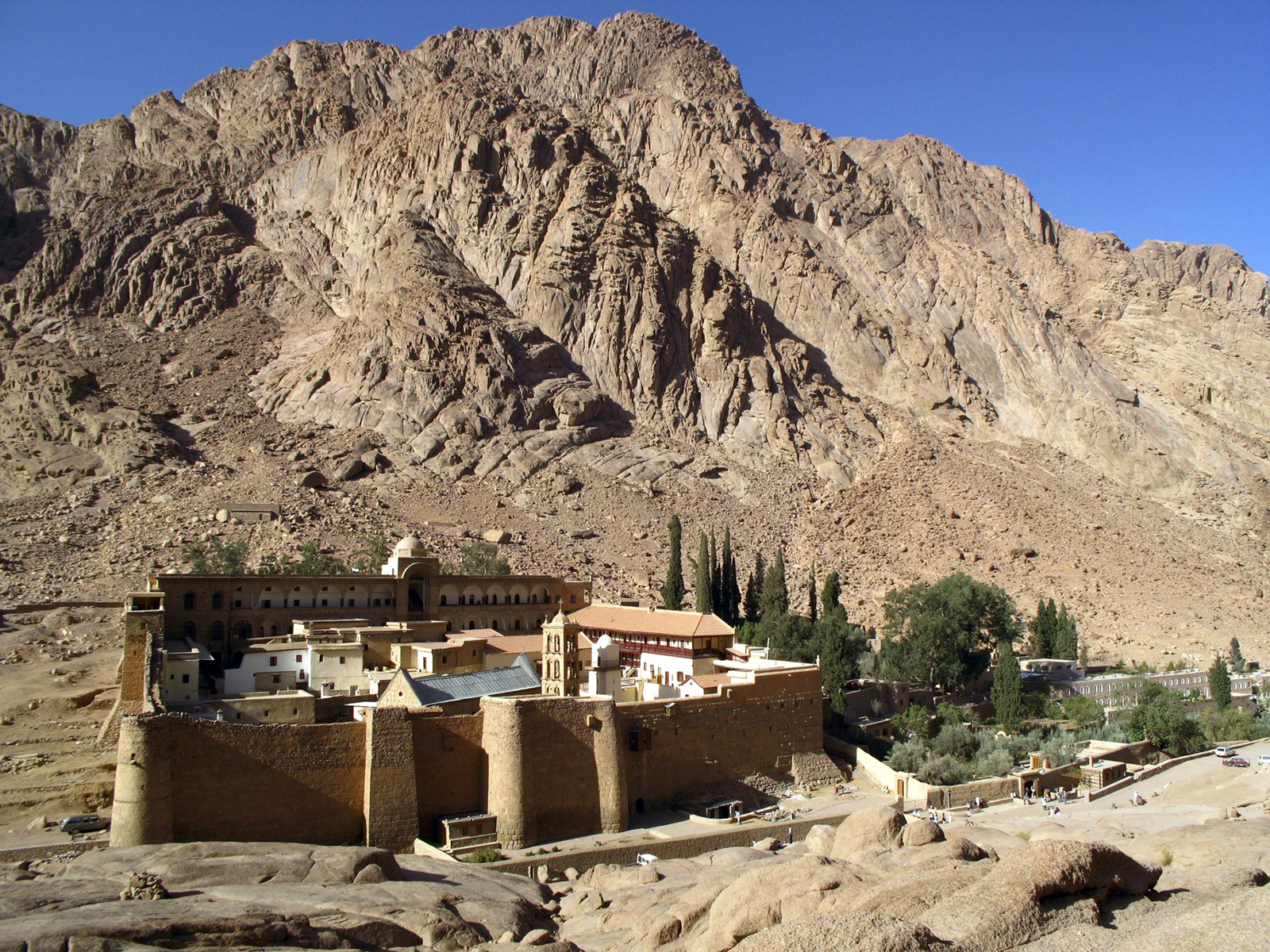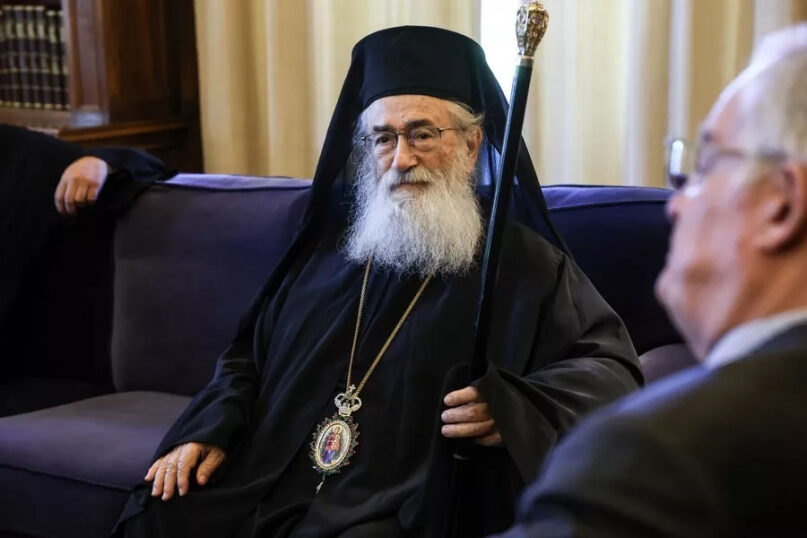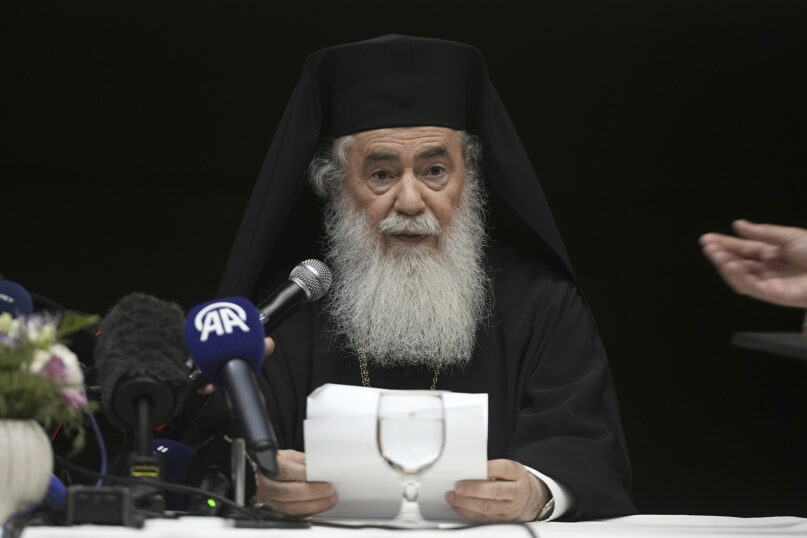
ISTANBUL (RNS) — Archbishop Damianos of St. Catherine’s Monastery announced his intention to step down on Thursday (Sept. 4), the latest development in a saga surrounding the ancient Orthodox Christian site at the foot of Mount Sinai in Egypt that has embroiled political authorities from Cairo and Athens and patriarchates of Jerusalem, Constantinople and beyond.
Founded in the sixth century by the Byzantine Emperor Justinian the Great, St. Catherine’s is considered the world’s oldest continually operated Christian monastery, a UNESCO world heritage site and home to a vast library of relics, icons and manuscripts dating back over a millennium.
However, in May, an Egyptian court issued a ruling that Orthodox leaders argued effectively nationalizes the monastery’s lands and endangers its monks’ way of life.
“The Egyptian courts decided that they would basically take away the property rights of the monastery, which is absolutely unprecedented. The Monastery in Sinai has existed under Muslim rule for — well, the entire history of muslim rule,” Samuel Noble, a scholar of Orthodox Christianity at Aga Khan University in London, told RNS.
“Now the Egyptian state steps in and decides that they own the property rights to it and the monks only have usufruct rights,” he continued. “That’s a catastrophe in a lot of ways. Both for the monastery itself and its ability to function as something other than a tourist site, but also for the question of property rights over its cultural heritage. It has the oldest manuscript collection that exists in the Western world. It has the oldest icon collection that wasn’t destroyed by Byzantine iconoclasm. There’s just an incredible artistic and cultural heritage which is there.”
Among the monastery’s treasures is the famous Ashtiname of Muhammad, a contract granting the monastery protection and privileges that is believed to bear the signature of the Islamic prophet himself.
Egypt has denied the claim that the new law is a threat, arguing it is acting as a protector of the monastery, not an attacker.
The monastery’s continued existence “serves as a testament to Egypt’s enduring commitment to preserving religious freedom, and protecting places of worship and devotion of all religions, in line with its constitution and legislation,” Omar Amer Youssef, Egypt’s ambassador to Greece, wrote in an op-ed last week for the Greek daily eKathemerini.
However, according to a recent report from the BBC, Egypt may have another reason for its interest in the monastery’s land. Since 2021, Egypt has advanced its “Great Transfiguration” project, which aims to drastically expand touristic infrastructure in the Sinai Peninsula, which includes the plain of El-Raha, below the monastery.
According to Christian and Muslim tradition, the plain is where the Israelites camped as Moses communed with God atop the holy mountain. Today, it is alive with development, with massive hotels, resorts, villas and mega-mall projects underway as the once-barren expanse is transformed into a tourist town.
“A hundred years ago, it took a lot to get to Sinai,” Noble explained. “Now you just fly to Sharm El Sheikh and take a bus up for the day. So now the Egyptian government can make a ton of money off of tourism. So they decided on what seems to be a very simple cash grab that really steps on these very, very ancient precedents.”

FILE – Archbishop Damianos of St. Catherine’s Monastery. (Photo by Thodoris Manolopoulos/Presidency of the Hellenic Republic)
Orthodox leaders in Egypt, Greece, Turkey and beyond panned the Egyptian government’s decision and urged Greece’s diplomatic corps to intervene.
Under the Greek constitution, Orthodox Christianity is considered the “prevailing religion” of the Greek state, and the protection of sites with a historic connection to the church or Byzantine rite, such as St. Catherine’s, often fall under the purview of the Greek embassy.
“This spiritual beacon of Orthodoxy and Hellenism is now facing an existential threat,” Archbishop Ieronymos II of Athens and All Greece said in May, demanding Greece’s political leadership intervene.
In July, the Greek parliament passed a bill to formalize Greece’s responsibility for the monastery and transfer control over its assets to newly established bodies in Greece. For months, Greek diplomats and high-level officials have been traveling back and forth to Egypt to discuss the matter.
“We are close to signing an agreement, in which the signature of the new abbot is also necessary, which will ensure the Greek Orthodox character of the monastery,” Greek Prime Minister Kyriakos Mitsotakis told journalists Sunday (Sept. 7) at a press conference in Thessaloniki.
Damianos’ decision comes in the wake of a much-publicized revolt by the monastery’s monks over his handling of the situation.
In late July, a group of monks wrote to Theophilos III, the patriarch of the Orthodox Church of Jerusalem, calling for the 91-year-old Damianos to be deposed and replaced as the leader of the monastery.
“The archbishop is very, very old and how much of his faculties he has is part of what’s under controversy right now. His detractors are saying he doesn’t have the ability to fill his role,” Noble said.
Among their chief complaints was the new Greek law, which they argued sidesteps the monks’ local leadership board in favor of committees in Greece whose only Egypt-based representative is Damianos.
In response, Damianos returned to the monastery with a cadre of armed guards who ransacked the dissident monks’ cells in the middle of the night and cast them out into the desert.

Greek Orthodox Patriarch Theophilos III speaks during a joint press conference with Latin Patriarch Cardinal Pierbattista Pizzaballa, not pictured, following their visit to the Gaza Strip in Jerusalem, Tuesday, July 22, 2025. (AP Photo/Mahmoud Illean)
Theophilos issued a statement last week summoning Damianos to Jerusalem to answer for the “scandal.”
“In order to avoid further scandal and for the sake of pacifying the unjustly expelled Fathers from the Holy Monastery, through other means and interventions, we command you to open the gates of this and to quickly release every illegitimate person who has taken up residence and is causing scandal and unrest,” the patriarchate wrote.
Though the Jerusalem Patriarchate considers the Sinai monastery to be under its ecclesiastical jurisdiction, Damianos has long rejected the idea, citing 18th-century Ecumenical Patriarchate of Constantinople Gabriel IV, who ruled it “autonomous, self-governing, free, unconquered, not subject to any Patriarchal Throne.”
Nonetheless, Damianos will resign from his post, effective this coming Friday (Sept. 12), opening up a general election among the monks to choose his successor.
“For the good of the Holy Monastery of Sinai, the era of mutual lawsuits and petitions must end with their withdrawal,” he noted in his public statement, seeking an end to the legal issues. “Otherwise, lengthy court battles will only perpetuate a climate of division and negative publicity.”
